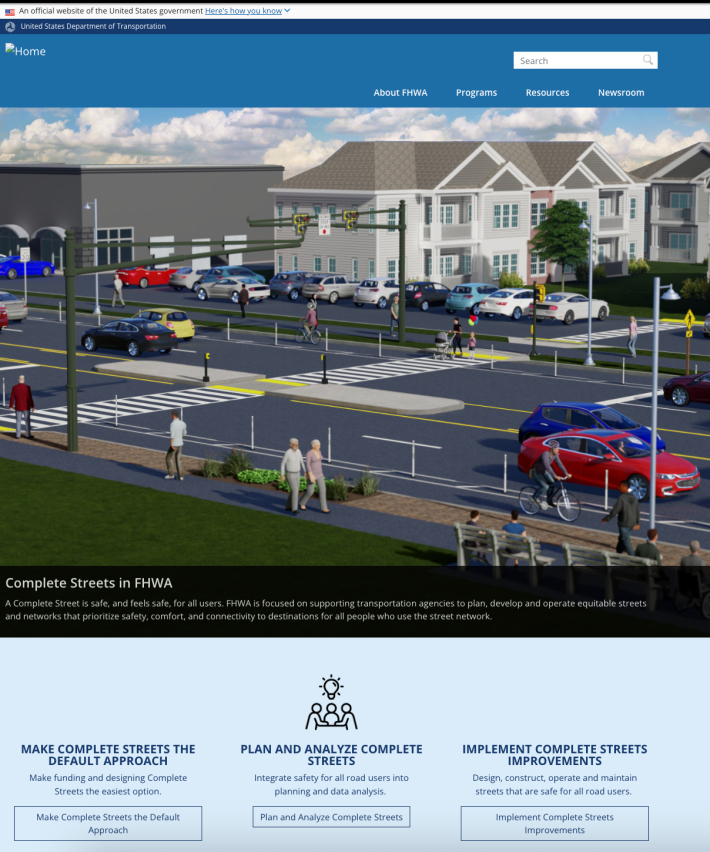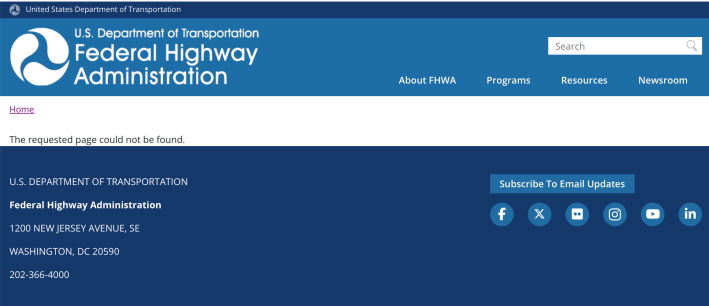A key federal resource to help communities make their streets safer has been purged from the U.S. DOT's website — and left advocates scratching their heads about why an agency supposedly laser-focused on saving lives on the road is removing the most basic resources communities need to do it.
Staff at Smart Growth America were shocked last month to learn that the federal Complete Streets page was among the thousands of government websites culled shortly after the start of the Trump administration, in what reporters for the New York Times called a "rush to heed President Trump’s orders targeting diversity initiatives and 'gender ideology.'"
Far from a hotbed of radical left politics, the Complete Streets website simply gathered resources on how to design roads that feel safe for everyone, no matter how they move, advocates argue. And some are still struggling to understand what was so offensive about a collection of case studies on sidewalk installations in Kentucky and guidebooks on the geometry of safe highway design — especially since those tools are proven to save lives, which Secretary Sean Duffy repeatedly claimed as his top priority during his Senate confirmation hearing.
"I can't think of any legitimate reason why you would want to make someone's job harder if they're trying to make streets safer, especially when we know that the numbers are so bad to begin with," said Heidi Simon, who leads the work of the Complete Streets Coalition for SGA. "If I had to guess, I would say it was part of a review of materials that were created under the previous administration, and it was on some list somewhere. But it's hard to imagine the logic behind pulling down these resources."


Simon added that the removal of the Complete Streets page isn't just symbolically troubling — even if the page's use of keywords like "equity" and "environmental justice," which the administration claims are dangerous symbols of "wokeness," probably helped get the it flagged for deletion.
Since it was first created in just 2022, the portal has brought together decades of largely publicly funded research on the safety impacts of things like bike lanes, sidewalks and road diets, which communities across America rely heavily on to prove to skeptics why those investments are worth making. It also included a wealth of guides aimed at helping communities make the business case for built environment changes, engage local communities in the process of building new infrastructure, and so much more.
Many of those tools still exist somewhere on the web — and others can be accessed on archiving sites like the Wayback Machine, albeit with painfully slow load times and broken graphics.
Still, Simon said the administration has essentially "taken a baseball bat to [that] shelf of resources" paid for by taxpayers, scattering them across hundreds of discrete URLs that already-overburdened transportation staffs will struggle to find — and if they can't find them, small cities especially are unlikely to be able to recreate those resources on their own.
"[Removing this page] goes directly against the stated priority of now-Secretary Duffy, which is safety," Simon added. "Complete Streets is not political; it is about making sure that we are improving safety and access for all road users. ... It's disheartening to know that there are people in the trenches at the local and state level who relied on these resources to get their jobs done, and their jobs just got made harder."
Erasing 'woke' and 'green'
The question of what qualifies as "political," though, has become murky in the month since the inauguration of President Trump, who has raised the poorly defined specter of "DEIA" and the "Green New Deal" to justify the slashing of a wide swath of government programs and initiatives that the administration opposes.
Like most broad design concepts, the Complete Streets approach can be a powerful tool to reduce racial and social inequities, as well as making cities more green and accessible to a wider cross section of U.S. residents — a feature of the idea that the last president championed, and in which Simon takes pride. But Complete Streets can also be used as a tool to advance ostensible conservative and bipartisan priorities, too, like increasing support for local businesses, improving community health outcomes, and of course, saving lives in crashes.
Still, Simon fears what communities might lose if the U.S. DOT did restore the Complete Streets page, but repackaged its resources to de-emphasize their value to confronting climate change and uplifting marginalized communities, who disproportionately bear the brunt of the universe of negative impacts that follow when streets are built for cars alone. "Complete Streets," after all, can all too easily be built in isolated segments where they don't poise a meaningful threat to oil dominance, rather than in networks which actually be used as a meaningful alternative to driving; they can also easily be concentrated outside the neighborhoods of color and low-income where people are most often losing their lives and suffering the burdens of car dependency.
"One of the reasons why I am so passionate about working on a topic like Complete Streets is that there are any number of benefits that come with adopting the approach — and you will see those benefits if the approach is adopted, whether or not you talk about those benefits," added Simon. "But at the same time, you are doing a disservice to the communities if you ignore the discussions that can — and should — be taking place about some of the legacies in our transportation system, or what the decision-making of today could mean for the future of communities."
"It's frustrating to think that something like complete streets — which has the mission of saving lives, of all things — can be caught in the crossfire of all of this turmoil," she added. "It really drove home for us that nothing is off limits; any of the work that we are doing to try and create the communities that we all want to see could be set aside very quickly, and without much forethought."
U.S. DOT did not respond to a request for comment as to why the page was purged.






